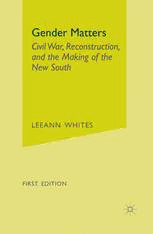
Gender Matters: Civil War, Reconstruction, and the Making of the New South PDF
Preview Gender Matters: Civil War, Reconstruction, and the Making of the New South
Gender Matters Gender Matters Civil War, Reconstruction, and the Making of the New South By LeeAnn Whites palgrave macmillan GENDERMATTERS © LeeAnn Whites,2005. Softcover reprint of the hardcover 1st edition 2005 978-1-4039-6311-6 All rights reserved.No part of this book may be used or reproduced in any manner whatsoever without written permission except in the case of brief quotations embodied in critical articles or reviews. First published in 2005 by PALGRAVE MACMILLAN™ 175 Fifth Avenue,New York,N.Y.10010 and Houndmills,Basingstoke,Hampshire,England RG21 6XS Companies and representatives throughout the world. PALGRAVE MACMILLAN is the global academic imprint of the Palgrave Macmillan division of St.Martin’s Press,LLC and of Palgrave Macmillan Ltd. Macmillan® is a registered trademark in the United States,United Kingdom and other countries.Palgrave is a registered trademark in the European Union and other countries. ISBN 978-1-4039-6312-3 ISBN 978-1-137-05915-4 (eBook) DOI 10.1007/978-1-137-05915-4 Library of Congress Cataloging-in-Publication Data Whites,LeeAnn Gender matters :Civil War,Reconstruction,and the making of the new South / LeeAnn Whites. p.cm. Includes bibliographical references and index. 1.Southern States—History—19th century.2.Southern States—Social conditions—19th century.3.Sex role—Southern States—History—19th century.4.Women—Southern States—History—19th century. 5.United States—History—Civil War,1861–1865—Women.6.United States— History—Civil War,1861–1865—Social aspects.7.Reconstruction (U.S.history, 1865–1877).8.Felton,Rebecca Latimer,1835–1930.9.Georgia—Politics and government—1865–1950.10.Georgia—Social conditions—19th century. I.Title. F215.W545 2005 975(cid:2).03—dc22 2004043152 A catalogue record for this book is available from the British Library. Design by Newgen Imaging Systems (P) Ltd.,Chennai,India. First edition:May 2005 10 9 8 7 6 5 4 3 2 1 For Sarah Contents Introduction 1 Part I Civil War and Reconstruction: Turning the Household Inside Out 9 1. The Civil War as a Crisis in Gender 11 2. Strong Minds and Strong Hearts: The Ladies National League and the Civil War as an Intragender War 25 3. “ARebel Though She Be”: Gender and Missouri’s War of the Households 45 4. Home Guards and Home Traitors: Loyalty and Prostitution in Civil War St. Louis 65 5. “Stand By Your Man”: The Ladies Memorial Association and the Reconstruction of Southern White Manhood 85 6. “You Can’t Change History By Moving a Rock”: Gender, Race, and the Cultural Politics of Confederate Memorialization 95 Part II Gender, Race, and Class in the Making of the New South 113 7. Paternalism and Protest in Augusta’s Cotton Mills: What’s Gender Got to do with It? 115 8. The De Graffenried Controversy: Class, Race, and Gender in the New South 127 viii Contents 9. Rebecca Latimer Felton and the Problem of Protection in the New South 151 10. Rebecca Latimer Felton and the Wife’s Farm: The Class and Racial Politics of Gender Reform 167 11. Love, Hate, Rape, Lynching: Rebecca Latimer Felton and the Gender Politics of Racial Violence 177 Notes 193 Acknowledgments 235 Index 237 Introduction T he central proposition of this historical work is that gender matters. Gender matters in the lives of individuals. We experi- ence our lives filtered through the lens of gender norms and gender roles. We understand ourselves as gendered beings. Gender matters in our relations to others—whether in our personal or public lives, as mothers, fathers, workers, or employers—and structures our place in rela- tion to others. It provides one lens through which we experience, inter- pret, appreciate, and judge the nature, the character, and the meaning of our relations to others. While gender matters most obviously in relations between men and women, and many would in fact argue that relations between men and women create gender itself, it is a proposition of this study that gender matters as much across the racial and class lines of the social order as it does between men and women of the same race and class. Altogether, gender matters in the myriad ways that it constructs indi- vidual’s sense of themselves and their place in the social order; in the way that it serves as one frame of social relations across the social landscape, from the most personal and intimate relations of the family to the most public and anonymous relations of the workplace or urban life. Gender matters in the way that society develops, is experienced, is transformed by individuals and groups acting out of their gendered identity, and social relations based on that identity.1 The location in time and place of this historical work is the nineteenth century. The nineteenth century was, for the country as a whole, a period of astonishing social transformation along virtually every axis of prior social ordering, as the rural became urban, the subsistence economy became market based, and the relatively independent male-headed household became the dependent and yet “separate” sphere of the family. In the South, this transformation of a traditional to a modern social order was experienced in a particularly extreme and wrenching fashion. Many would argue that it was so wrenching and so extreme that the South never made it to “modern” in the nineteenth century. There was, in the first place, the extremity of slavery, extreme in its existence and extreme in its abolition. There was the wrenching fashion in which slavery as a social form, and the South as the politically and economically dominant region, was taken down in the violence of war, both the formal war of 1861–1865, and the long and grinding economic and social war in the decades that followed. These three factors: slavery, war, and the poverty and violence of the
